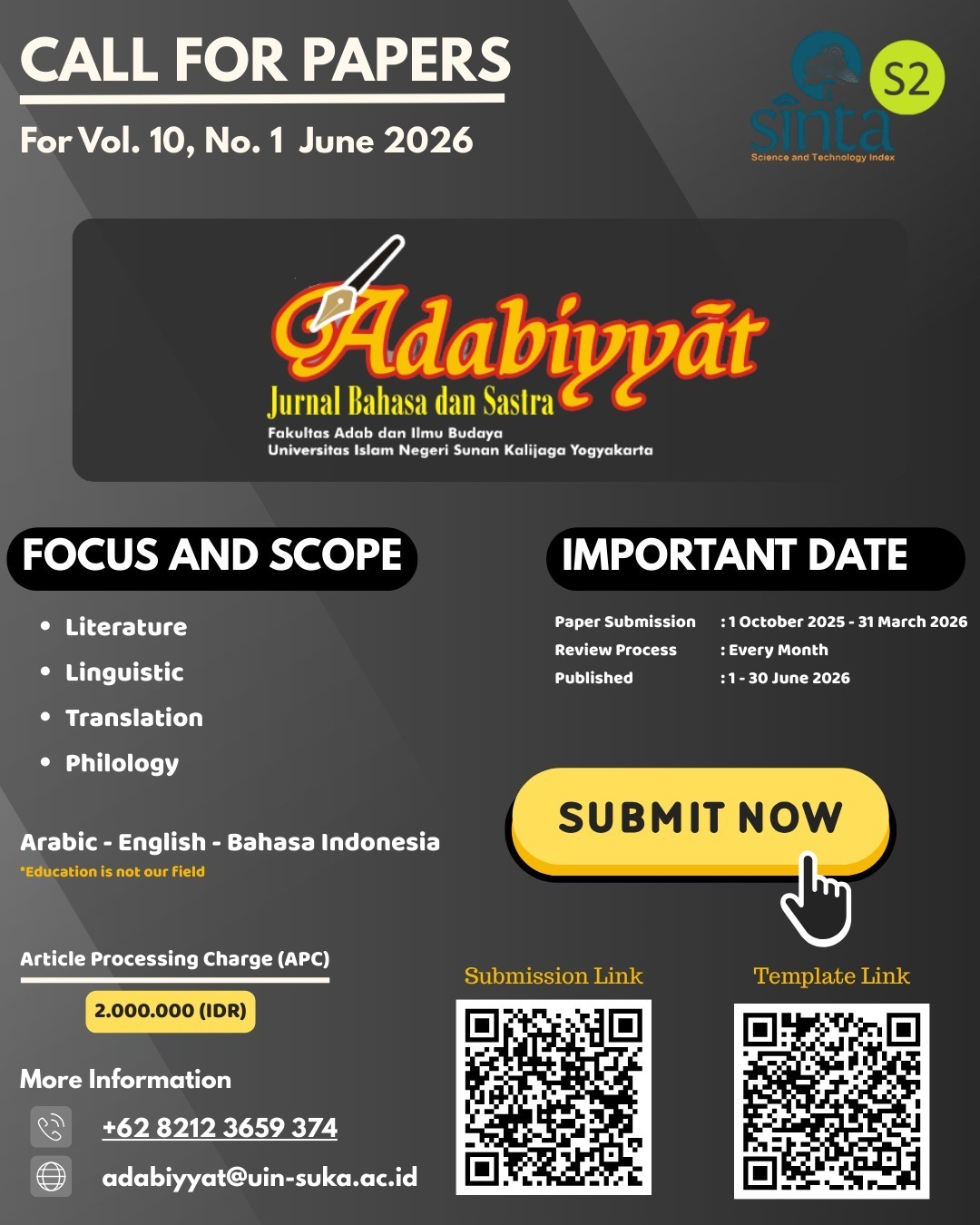REPRESENTASI RADIKALISME DAN DERADIKALISME AGAMA DALAM SASTRA PESANTREN
DOI:
https://doi.org/10.14421/ajbs.2018.02104الملخص
Radicalism is not only a challange to a nation-state system but also a threat to the diverse and tolerance of Indonesian. Even literary works are potential to be a site of meanings that fertilizes radicalism through narrations. Therefore, this article scrutinizes the ability of literary texts to support or to counter radicalism in Indonesia. The chosen Sastra Pesantren (Pesantren literature) in this research are Menggapai Kosong by Izzul Muttaqin and Rebbe by Laila Haqy. The focus of this research is ideological position of the author in presenting religious-humanist discourse as a formula of antiradicalism. The analysis is done through a mapping of religious-humanist discourse in the literary texts with considering historical moment and place of the production. Stuart Hall’s representation theory is used in this article. Through constructionist approach this research analyzes the ability of language system in contructing concepts in our minds or to make the material world is meaningfull. The result of this analysis shows that the two pesantren literary works has represented deradicalism as efforts to against religious radicalism. The policies of the government in fighting radicalism have important roles in constructing the divinity and culture of society as recorded by the Pesantren literature.التنزيلات
المراجع
Armedian, Darus. 2017. Dari Batu Jatuh Sampai Pelabuhan Rubuh. Surabaya: Dewan Kesenian Jawa Timur.
BBC News Indonesia. 2017. “Aksi 212: Rizieq Shihab Datang dan Menyeru ‘Penjarakan Ahok”. BBC News Indonesia, 21-2-2017. https://www.bbc.com/indonesia/indonesia-39035135. Diakses pada 3 April 2018
Hall, Stuart. 1997. “The Work of Representation”. Dalam Representation: Cultural Representations and Signifying Practices, diedit oleh Stuart Hall. London: Sage in association with the Open University.
Haqy, Laila. 2017. “Rebbe”. Dokumen Untuk Sayembara Penulisan Sastra pesantren tahun 2017.
Haryatmoko. 2015. Membongkar Rezim Kepastian: Pemikiran Kritis Post-Strukturalis. Yogyakarta: Boekoe Tcap Petroek.
Human Rights Watch. 2017. “Indonesia’s ‘Religious Tolerance Model’ Fantasy.” Human Rights Watch. 30 Oktober 2017. https://www.hrw.org/news/2017/10/30/indonesias-religious-tolerance-model-fantasy. Diakses pada 2 Mei 2018.
Jirnaya, I. Ketut. 2015. “Sinkretisme Hindu-Islam dalam Mantra: Sebuah Kasus Dalam Teks Usada Manak.” Adabiyyāt: Jurnal Bahasa dan Sastra 14 (2): 282–300. http://ejournal.uin-suka.ac.id/adab/ Adabiyyat/article/view/14206
Khairur Rozikin. 2017. Dokumen Wawancara Tahun 2017.
Kian Gie, Kwik. 2011. “Apa Neo Liberalisme (Neolib) Itu? Bagian 1.” Blog. Forum Kwik Kian Gie. Maret 2011. http://kwikkiangie.com /v1/2011/03/apa-neo-liberalisme-neolib-itu-bagian-1/. Diakses pada 2 Mei 2018.
Ma’mun, Muhammad. 2017. Dokumen Wawancara Tahun 2017.
Muttaqin, Izzul. 2016. Menggapai Kosong. Yogyakarta: Interlude.
Rahman, Jamal D. 2008. “Sastra, Pesantren, dan Radikalisme Islam.” Jamal D. Rahman.wordpress.com. Oktober 2008. https:// jamaldrahman.wordpress.com/2008/10/25/sastra-pesantren-dan-radikalisme-islam/?wref=tp. Diakses pada 2 Mei 2018.
Tami, Rosmah, Faruk, dan Ida Rochani Adi. 2017. “Hegemonic Culture and Subaltern: A Compromised Veil in Indonesian Islamic Popular Novel.” Lingua Cultura 11 (1): 13–18. Http://journal.binus.ac.id/ index.php/Lingua/article/view/1729.
Ubaidillah. 2014. “Nilai-Nilai Ajaran Salafi dalam Buku Ajar Bahasa Arab al-Arabiyyah Bayna Yadaik (Analisis Semiotik Roland Barthes).” Adabiyyāt: Jurnal Bahasa dan Sastra 13 (1): 1–21. Http://ejournal.uin-suka.ac.id/adab/Adabiyyat/article/view/13101.
التنزيلات
منشور
إصدار
القسم
الرخصة
الحقوق الفكرية (c) 2018 Hat Pujiati

هذا العمل مرخص بموجب Creative Commons Attribution-ShareAlike 4.0 International License.
- Adabiyyāt: Jurnal Bahasa dan Sastra publishes all articles entirely in full text.
- It is permissible for readers to download and to use it for scientific purposes and scientific dissemination.
- The author can re-publish the article that has been published by the Adabiyyāt: Jurnal Bahasa dan Sastra after obtaining written permission from the editor. This letter can be obtained by submitting a request letter for permission to republish the article to Adabiyyāt: Jurnal Bahasa dan Sastra via email adabiyyat@uin-suka.ac.id. In the second publication, the author is required to include information that the article was firstly published by the Adabiyyāt: Jurnal Bahasa dan Sastra.




















